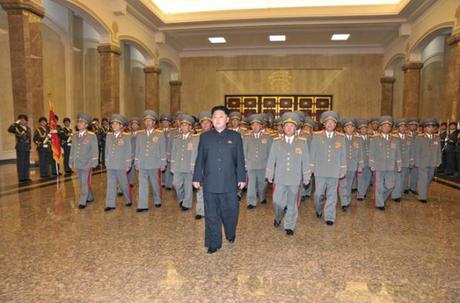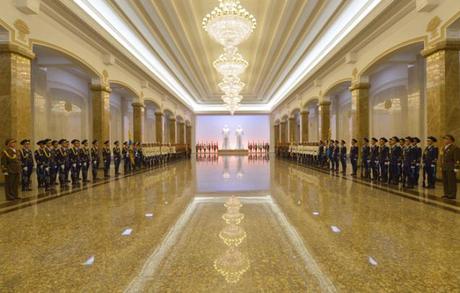
Kim Jong Un and senior KPA officials visit Ku’msusan Palace of the Sun in Pyongyang on 10 October 2013 (Photo: Rodong Sinmun).
Kim Jong Un (Kim Cho’ng-u’n) visited the Ku’msusan (Memorial) Palace of the Sun at midnight on 10 October (Thursday), the 68th anniversary of the foundation of the Korean Workers’ Party [KWP]. Visiting Ku’msusan with him were VMar Choe Ryong Hae (Director of the Korean People’s Army [KPA] General Political Department), Gen. Ri Yong Gil (Chief of the KPA General Staff), Gen. Jang Jong Nam (Minister of the People’s Armed Forces), along with senior KPA officials, commanders of KPA service branches and corps units, and members of the KPA’s KWP Committee. Kim Jong Un’s last observed appearance was at a commemorative photo session with members of the Kim Il Sung (Kim Il-so’ng) University faculty who were moving into a new apartment complex.
Kim Jong Un and the members of the KPA’s high command first visited a hall containing statues of his grandfather, late DPRK President and founder Kim Il Sung, and his father, late leader Kim Jong Il (Kim Cho’ng-il). Floral baskets from Kim Jong Un and the KPA were placed in front of the statues. The group went to a chamber where Kim Il Sung’s remains permanently lie in state. According to KCNA, Kim Jong Un “together with other visitors paid homage to him in the humblest reverence.” They then visited an exhibition of awards, titles, honorary degrees Kim Il Sung received as well as Kim Il Sung’s personal railway coach and car. The group then visited the chamber where Kim Jong Il’s personal remains lie permanently in state and “paid homage to him in the humblest reverence.” Kim Jong Un and the senior military leaders then visited an exhibition containing awards, state titles and honorary degrees that Kim Jong Il received and an exhibition of Kim Jong Il’s personal railway coach, an electric cart, his boat and his black Mercedes-Benz S-Class sedan.
The Ku’msusan visit on the party’s anniversary was the first observed occasion in DPRK state media at which Gen. Ri Yong Gil was identified as Chief of the KPA General Staff. Interestingly, on a party-centered occasion, the coterie that accompanied Kim Jong Un on his latest visit to Ku’msusan consisted only of senior KPA officials. While some members of the KPA’s high command are members of the Party Central Committee or the Party Central Military Commission and with the exception of VMar Choe Ryong Hae (KWP Secretary of Military Affairs), no members of the KWP Secretariat or any KWP Central Committee Department Directors were reported to be in attendance.

View of the statue hall at Ku’msusan Palace of the Sun on 10 October 2013, the 68th anniversary of the foundation of the Korean Workers’ Party (Photo: Rodong Sinmun).
Filed under: 2007-2010 kpa management, Central Committee, Central Military Committee, central party life, Choe Ryong Hae, Col. Gen. Choe Kyong Song, Col. Gen. Jon Chang Bok, Col. Gen. Kim Hyong Ryong, Col. Gen. No Kwang Chol (KPAGS), Col. Gen. O Il Jong, Col. Gen. O Kum Chol, Col. Gen. Pyon In Son, Col. Gen. Son Chol Ju, colonel general, corps command, corps commanders, DPRK Intelligence Community, Events Management Section, Gen. Jang Jong Nam, Gen. Kim Yong Chol, Gen. Ri Yong Gil, gsd, gsob, Guard Command, Kim Chong-un inspections, Kim Family, Kim Jong Un Visits, Kim Jong-il, Kim Jong-un, KJI Personal Secretariat, Korean People's Army (KPA), Korean People's Army Supreme Command, Korean People's Internal Security Forces, Korean Workers' Party (KWP), KPA General Political Bureau, KPA General Political Department, KPA General Propaganda Department, KPA General Staff, KPA Large Combined Units, KPA supernumerary organizations, KPA Supreme Command, kpif, local people's committees, Lt. Gen. Kim Rak Gyom (SRFC), Lt. Gen. Kim Su Gil, Lt. Gen. Pak Jong Chon, Lt. Gen. Ryom Chol Song, Lt. Gen. Son Jong Nam, Maj. Gen. An Ji Yong, Mangyo'ngdae Revolutionary School Alumni, military security command [msc], ministry of people's security, Ministry of State Security, Ministry of the People's Armed Forces (MPAF), MPAF GPB, National Defense Commission (NDC), Navy Command, NDC Administration Department, North Korean press, Organization and Guidance Department, party life, Political Bureau, primary party committees, Propaganda and Agitation Department, Pyongyang Defense Command, reserve training units, Secretariat, State Security Department, worker peasant red guard, Young Red Guard
